Ximing Wen
GridRoute: A Benchmark for LLM-Based Route Planning with Cardinal Movement in Grid Environments
May 30, 2025



Abstract:Recent advancements in Large Language Models (LLMs) have demonstrated their potential in planning and reasoning tasks, offering a flexible alternative to classical pathfinding algorithms. However, most existing studies focus on LLMs' independent reasoning capabilities and overlook the potential synergy between LLMs and traditional algorithms. To fill this gap, we propose a comprehensive evaluation benchmark GridRoute to assess how LLMs can take advantage of traditional algorithms. We also propose a novel hybrid prompting technique called Algorithm of Thought (AoT), which introduces traditional algorithms' guidance into prompting. Our benchmark evaluates six LLMs ranging from 7B to 72B parameters across various map sizes, assessing their performance in correctness, optimality, and efficiency in grid environments with varying sizes. Our results show that AoT significantly boosts performance across all model sizes, particularly in larger or more complex environments, suggesting a promising approach to addressing path planning challenges. Our code is open-sourced at https://github.com/LinChance/GridRoute.
Proceedings of 1st Workshop on Advancing Artificial Intelligence through Theory of Mind
Apr 28, 2025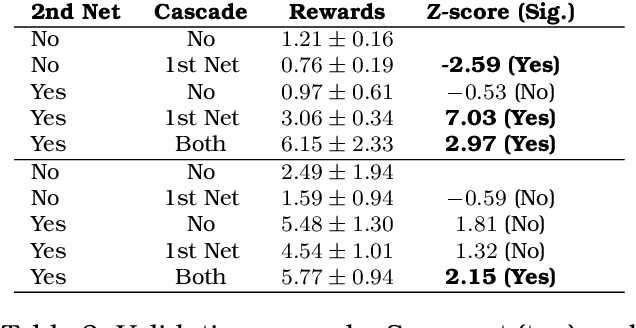


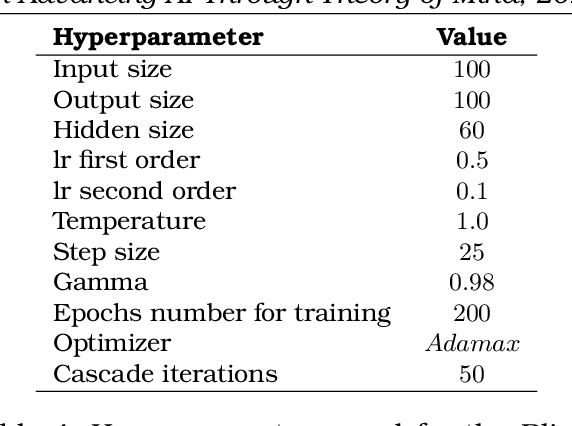
Abstract:This volume includes a selection of papers presented at the Workshop on Advancing Artificial Intelligence through Theory of Mind held at AAAI 2025 in Philadelphia US on 3rd March 2025. The purpose of this volume is to provide an open access and curated anthology for the ToM and AI research community.
How Well Can Vison-Language Models Understand Humans' Intention? An Open-ended Theory of Mind Question Evaluation Benchmark
Mar 28, 2025Abstract:Vision Language Models (VLMs) have demonstrated strong reasoning capabilities in Visual Question Answering (VQA) tasks; However, their ability to perform Theory of Mind (ToM) tasks such as accurately inferring human intentions, beliefs, and other mental states remains underexplored. In this work, we propose an open-ended question framework to comprehensively evaluate VLMs' performance across diverse categories of ToM tasks. We curated and annotated a benchmark dataset composed of 30 images. We then assessed the performance of four VLMs of varying sizes on this dataset. Our experimental results show that the GPT-4 model outperformed all others, with only one smaller model, GPT-4o-mini, achieving comparable performance. Additionally, we observed that VLMs often struggle to accurately infer intentions in complex scenarios such as bullying or cheating. Moreover, our findings also reveal that smaller models can sometimes infer correct intentions despite relying on incorrect visual cues.
A Transformer and Prototype-based Interpretable Model for Contextual Sarcasm Detection
Mar 14, 2025Abstract:Sarcasm detection, with its figurative nature, poses unique challenges for affective systems designed to perform sentiment analysis. While these systems typically perform well at identifying direct expressions of emotion, they struggle with sarcasm's inherent contradiction between literal and intended sentiment. Since transformer-based language models (LMs) are known for their efficient ability to capture contextual meanings, we propose a method that leverages LMs and prototype-based networks, enhanced by sentiment embeddings to conduct interpretable sarcasm detection. Our approach is intrinsically interpretable without extra post-hoc interpretability techniques. We test our model on three public benchmark datasets and show that our model outperforms the current state-of-the-art. At the same time, the prototypical layer enhances the model's inherent interpretability by generating explanations through similar examples in the reference time. Furthermore, we demonstrate the effectiveness of incongruity loss in the ablation study, which we construct using sentiment prototypes.
Language Model Meets Prototypes: Towards Interpretable Text Classification Models through Prototypical Networks
Dec 04, 2024Abstract:Pretrained transformer-based Language Models (LMs) are well-known for their ability to achieve significant improvement on NLP tasks, but their black-box nature, which leads to a lack of interpretability, has been a major concern. My dissertation focuses on developing intrinsically interpretable models when using LMs as encoders while maintaining their superior performance via prototypical networks. I initiated my research by investigating enhancements in performance for interpretable models of sarcasm detection. My proposed approach focuses on capturing sentiment incongruity to enhance accuracy while offering instance-based explanations for the classification decisions. Later, I developed a novel white-box multi-head graph attention-based prototype network designed to explain the decisions of text classification models without sacrificing the accuracy of the original black-box LMs. In addition, I am working on extending the attention-based prototype network with contrastive learning to redesign an interpretable graph neural network, aiming to enhance both the interpretability and performance of the model in document classification.
The Impact of an XAI-Augmented Approach on Binary Classification with Scarce Data
Jul 01, 2024



Abstract:Point-of-Care Ultrasound (POCUS) is the practice of clinicians conducting and interpreting ultrasound scans right at the patient's bedside. However, the expertise needed to interpret these images is considerable and may not always be present in emergency situations. This reality makes algorithms such as machine learning classifiers extremely valuable to augment human decisions. POCUS devices are becoming available at a reasonable cost in the size of a mobile phone. The challenge of turning POCUS devices into life-saving tools is that interpretation of ultrasound images requires specialist training and experience. Unfortunately, the difficulty to obtain positive training images represents an important obstacle to building efficient and accurate classifiers. Hence, the problem we try to investigate is how to explore strategies to increase accuracy of classifiers trained with scarce data. We hypothesize that training with a few data instances may not suffice for classifiers to generalize causing them to overfit. Our approach uses an Explainable AI-Augmented approach to help the algorithm learn more from less and potentially help the classifier better generalize.
Interpretable Models for Detecting and Monitoring Elevated Intracranial Pressure
Mar 04, 2024


Abstract:Detecting elevated intracranial pressure (ICP) is crucial in diagnosing and managing various neurological conditions. These fluctuations in pressure are transmitted to the optic nerve sheath (ONS), resulting in changes to its diameter, which can then be detected using ultrasound imaging devices. However, interpreting sonographic images of the ONS can be challenging. In this work, we propose two systems that actively monitor the ONS diameter throughout an ultrasound video and make a final prediction as to whether ICP is elevated. To construct our systems, we leverage subject matter expert (SME) guidance, structuring our processing pipeline according to their collection procedure, while also prioritizing interpretability and computational efficiency. We conduct a number of experiments, demonstrating that our proposed systems are able to outperform various baselines. One of our SMEs then manually validates our top system's performance, lending further credibility to our approach while demonstrating its potential utility in a clinical setting.
MobilePTX: Sparse Coding for Pneumothorax Detection Given Limited Training Examples
Dec 08, 2022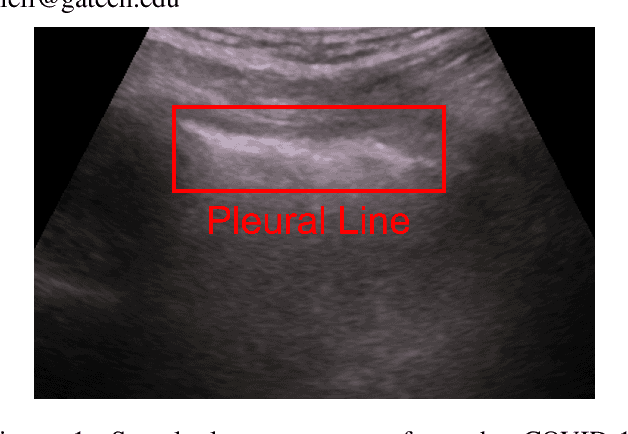
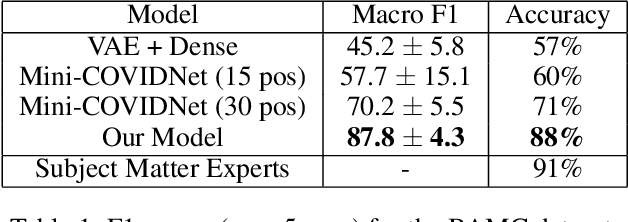


Abstract:Point-of-Care Ultrasound (POCUS) refers to clinician-performed and interpreted ultrasonography at the patient's bedside. Interpreting these images requires a high level of expertise, which may not be available during emergencies. In this paper, we support POCUS by developing classifiers that can aid medical professionals by diagnosing whether or not a patient has pneumothorax. We decomposed the task into multiple steps, using YOLOv4 to extract relevant regions of the video and a 3D sparse coding model to represent video features. Given the difficulty in acquiring positive training videos, we trained a small-data classifier with a maximum of 15 positive and 32 negative examples. To counteract this limitation, we leveraged subject matter expert (SME) knowledge to limit the hypothesis space, thus reducing the cost of data collection. We present results using two lung ultrasound datasets and demonstrate that our model is capable of achieving performance on par with SMEs in pneumothorax identification. We then developed an iOS application that runs our full system in less than 4 seconds on an iPad Pro, and less than 8 seconds on an iPhone 13 Pro, labeling key regions in the lung sonogram to provide interpretable diagnoses.
Knowledge Compilation in Multi-Agent Epistemic Logics
Jun 28, 2018
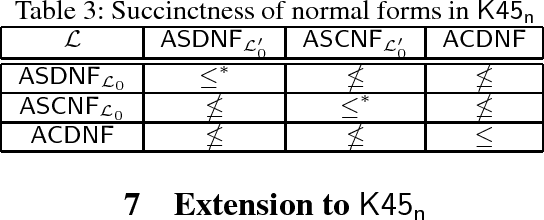

Abstract:Epistemic logics are a primary formalism for multi-agent systems but major reasoning tasks in such epistemic logics are intractable, which impedes applications of multi-agent epistemic logics in automatic planning. Knowledge compilation provides a promising way of resolving the intractability by identifying expressive fragments of epistemic logics that are tractable for important reasoning tasks such as satisfiability and forgetting. The property of logical separability allows to decompose a formula into some of its subformulas and thus modular algorithms for various reasoning tasks can be developed. In this paper, by employing logical separability, we propose an approach to knowledge compilation for the logic Kn by defining a normal form SDNF. Among several novel results, we show that every epistemic formula can be equivalently compiled into a formula in SDNF, major reasoning tasks in SDNF are tractable, and formulas in SDNF enjoy the logical separability. Our results shed some lights on modular approaches to knowledge compilation. Furthermore, we apply our results in the multi-agent epistemic planning. Finally, we extend the above result to the logic K45n that is Kn extended by introspection axioms 4 and 5.
 Add to Chrome
Add to Chrome Add to Firefox
Add to Firefox Add to Edge
Add to Edge